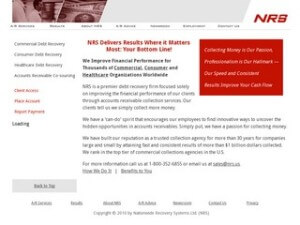 NRS is a collection agency with three primary lines of revenue: Consumer, Commercial and Medical debt recovery. Staff consisted of 220+ with primary offices in Dallas and Tyler, Texas and gross revenues in excess of $ 15 million. Company lost ~ $1.5 million each year from 2008 through 2010 and became insolvent in 2011 with several states demanding the company file Chapter 7 or face legal fines and sanctions.
NRS is a collection agency with three primary lines of revenue: Consumer, Commercial and Medical debt recovery. Staff consisted of 220+ with primary offices in Dallas and Tyler, Texas and gross revenues in excess of $ 15 million. Company lost ~ $1.5 million each year from 2008 through 2010 and became insolvent in 2011 with several states demanding the company file Chapter 7 or face legal fines and sanctions.
President July 2011 – January 2012
• Achieved a 90 day turnaround with a run rate of $1 million EBITDA for 2012 posting approximately $250K in EBIDTA for Q4 2011.
• Negotiated settlements with states to waive fines and Chapter 7 demands.
• Rebuilt our in/outbound lead generation systems utilizing both direct mail coupled with a pull email system.
• Refocused outbound call center to focus on profitable revenue metrics that rewarded profitable business. Reduced overhead 40% while increasing average employees compensation by 15%.
• Regulator Praises Turnaround at Collection Agency it Targeted Press Release that also helped manage our brand and industry perspective.
Press Release
“Minnesota state collection industry regulators played a key role in helping bring in new management and ownership that has successfully turned around a venerable Dallas-based agency.
Nationwide Recovery Systems, Ltd, an agency founded over 30 years ago, grew rapidly under the original founding leadership. The company added a healthcare collection division through an acquisition in Tyler, Texas, and by 2005 was one of the largest commercial, healthcare, and consumer debt collection agencies in the country. When the founder left the company in 2005, the company began to struggle.
By 2010, the company was losing money and the former owners were tiring of putting capital into the business. The company also encountered compliance issues when it failed to get an injection of cash from its former owners to cover a shortfall in its client trust account. Minnesota, like many states, requires a separate client trust account. After the trust fund shortfall was corrected, an independent auditor verified that all amounts due and collected by the agency were paid to customers according to terms.
In July of this year, Nationwide Recovery Holdings, LLC and Recovery Investments, LLC purchased the partnership units of Nationwide Recovery Systems, Ltd. The new owners injected capital into the company and quickly rebuilt the top management team.
“The Minnesota Department of Commerce is pleased with the work this new management team has done in recent months to turn NRS around,” said Department spokesman Matt Swenson. “The Department of Commerce will continue working with management to closely monitor their progress and ensure the company’s viability into the future.”
Earlier this month, the Minnesota Department of Commerce named NRS as one of eight ARM companies it had targeted for enforcement action over hiring and accounting practices.
Swenson emphasizes that the previous regulatory action against NRS “was brought against NRS because of the actions of former management, not because of the actions of the new owners.”
Prior to the purchase of NRS, the new management group met with the Minnesota state regulators and outlined a plan to improve the agency’s operations. After getting full support from the Minnesota team, the new owners proceeded to close the purchase and execute the turnaround. In less than 90 days, the new management group was able to return the agency to profitability.
“Our turnaround strategy focuses on three key areas: people, people, and people,” says Brian Gulledge, the new President of NRS. “Getting the right people in the right place on the bus is the single most important thing we have done to improve our operations,” says Gulledge.
Taking a page from Jim Collins’ Good to Great, Gulledge notes that the old management had a hard time getting people in the right place on the bus – and making tough decisions on performance. “If you fail to act when you know someone is underperforming in this business, you won’t make it,” says Gulledge.
The new performance-based culture at NRS showed up on the bottom line almost immediately. Underperforming collectors were terminated and the top collectors produced more. “A players don’t want to work beside C players,” says Gulledge. This is another principle straight from Good to Great: if you allow C players to stay on the bus too long, they will demotivate the A players, and the A players will leave.
Collection agency culture can go one of two ways: either the A players take over and the culture becomes in inhospitable to C players, or the C players take over and the A players leave.
In NRS’ case, the agency was lucky to find new owners who could recognize A-level talent and put A players in the right place on the bus. The agency was also lucky to have regulators who recognized the talent of the new management/ownership group and encourage them to invest in the turnaround of NRS. Not all agencies who find themselves in trouble with state regulators are so lucky.”